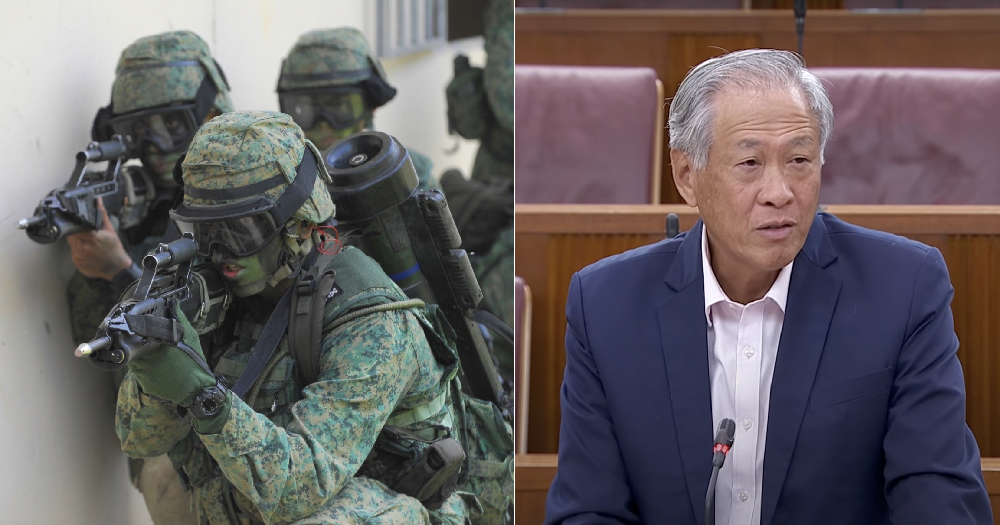Follow us on Telegram for the latest updates: https://t.me/mothershipsg
Smaller cohorts in the Singapore Armed Forces (SAF) due to low total fertility rates will not compromise Singapore's national defence, Defence Minister Ng Eng Hen said on Wednesday, Jan. 12.
"Despite a smaller NS pool, the SAF continues to be an effective military force and a strong deterrent against any potential threat," he added.
Falling fertility rate "a core challenge" identified decades ago
Ng was responding to Member of the Parliament (MP) Christopher de Souza's query in Parliament on how the SAF will use technological advancement to keep its forces "formidable and mission-ready" in light of the falling fertility rate in Singapore to 1.1 in 2020.
The Ministry of Defence (Mindef) agreed with de Souza that Singapore's low fertility rates poses a significant structural challenge to the SAF in maintaining a strong national defence, he said.
Ng further said that the SAF has recognised this as a core challenge about three decades ago, and has since included manpower requirements as a key strategic factor in formulating plans and procuring platforms.
Revised process to function with less manpower
According to Ng, strict discipline was applied to all units in Air, Land and Sea services such that processes were revised to be able to function with less manpower, but "at the same or even greater effectiveness".
"These were bold and ambitious measures and forced a re-look across the entire SAF to leverage technology to improve manpower productivity," Ng said.
Ng added that many new platforms acquired had to satisfy stringent requirements for manpower.
To illustrate his point, Ng said the SAF recently acquired the TPQ-53 Weapon Locating Radar, which makes use of automation and reduces manpower requirements by 30 per cent compared with its predecessors, and also has an increased detection range.
The Navy also uses unmanned new vessels for maritime surveillance and security in the Singapore Straits.
Must continue to optimise manpower
As a result of the measures, Ng said the modernised SAF is lean and effective, but he also stressed the need to further "optimise manpower".
To further improve the SAF's work processes and raise their productivity, Ng said they will have to incorporate advancements in robotics, data analytics, and artificial intelligence (AI).
For instance, automated vehicles are being trialled in the SAF's airbases to transport equipment and personnel along pre-programmed routes, and AI-enabled drones are also used to assess damage along runways.
"Job re-design"
Additionally, Ng mentioned the importance of "job re-design" in order to optimise manpower resources.
For example, servicemen who were previously exempted due to medical issues can now serve as security troopers in SAF's camps and critical installations after the introduction of unmanned watchtowers.
Follow and listen to our podcast here
Top image via Mindef/Facebook & gov.sg/Youtube
If you like what you read, follow us on Facebook, Instagram, Twitter and Telegram to get the latest updates.
